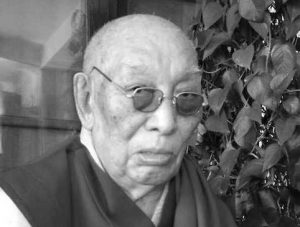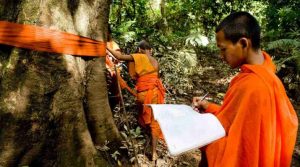Comparing Amitabha’s three vows of rebirth in the Land of Bliss
Among Amitabha’s three vows of deliverance for rebirth, aspirants mentioned in the 18th Vow include all sentient beings of different aptitudes and capacities, races and nationalities, religions and cultures. The only method to attain assured rebirth is exclusive Amitabha-recitation as stated in the vow, and this method is clearly the easiest among the three.
Aspirants of the other two vows rely on the dedication of their own merit and virtues for rebirth, attained through “self-powered” meditative and non-meditative practices. In contrast, aspirants who rely on the 18th Vow receive Amitabha’s merit and virtues attained through the “other-powered” practice of Amitabha-recitation.
Amitabha Buddha assures aspirants of rebirth in his 18th Vow alone. In other words, aspirants of the 19th and 20th Vow are not assured of rebirth in their present lifetime, but will be toward the end of their lives, provided they are capable of being mindful of the Buddha.
If Amitabha’s 18th Vow is the easiest and most direct path to rebirth in the Land of Bliss, why did Amitabha make two other vows and provide two other methods—as stated in the 19th and 20th Vows—for sentient beings to attain rebirth in the Land of Bliss?
It is rare and difficult to hear the Pure Land teaching from the Buddha
Assured rebirth attained through exclusive Amitabha-recitation in the present life, in accordance with Amitabha’s 18th Vow, is the easiest practice for dwelling in the Definitely Assured State and unfailingly reaching Nirvana (in accordance with Amitabha’s 11th Vow). As the reward is so splendid and the practice so easy, the Pure Land tradition is the most difficult to believe among Buddhist teachings.
In the Infinite Life Sutra, Shakyamuni Buddha says at the end:
It is difficult to encounter and behold Tathagata when he is in this world. Difficult to access, difficult to hear are the Buddhas’ teachings and scriptures. It is also difficult to hear the excellent teachings for bodhisattvas, the paramitas.
Shakyamuni Buddha continues:
Difficult too is to meet a good teacher, to hear the Dharma and perform the practices. But the most difficult of all difficulties is to hear this sutra, have faith in it with joy and hold fast to it. Nothing is more difficult than this.
The opportunity to hear the Infinite Life Sutra, which tells of the Land of Bliss, Amitabha’s name, and his liberating vows, is truly rare. It is profoundly difficult for ordinary beings in the Six Realms, or even bodhisattvas, to come across a buddha or a good teacher who delivers this sutra.
Accommodating those who have difficulties believing in the 18th Vow
The original intent of Dharmakara Bodhisattva, the former incarnation of Amitabha Buddha, was to deliver all sentient beings in the ten directions to be reborn in his buddha-land. He resolved that not one would be excluded from his equal, unconditional, and compassionate deliverance.
Dharmakara Bodhisattva understood the circumstances in this Saha world very well. Thus, he made the 19th Vow and 20th Vow to accommodate all those who have difficulties in believing and holding fast to the teaching of Amitabha’s deliverance through his Name. These vows would also serve to guide these practitioners to the 18th Vow.
Dharmakara Bodhisattva identified two groups of sentient beings who have different concerns and doubts about the 18th Vow. As Shakyamuni Buddha says in the passage on “rebirth by womb” in the Infinite Life Sutra: firstly, they do various meritorious deeds aspiring for rebirth in that land while having doubt in the Buddha’s wisdom (like aspirants of the 19th Vow). These practitioners believe in other-power, but still think they must contribute to their own deliverance by doing various meritorious deeds. Amitabha Buddha cannot assure them of their rebirth because the decision to fully renounce self-power and the cultivation of merit and virtues is the prerogative of the practitioner. Amitabha Buddha can only promise to appear before them near their end of life and let them make the final decision at this critical moment.
Secondly, they doubt the Buddha’s wisdom but believe in retribution for evil and reward for virtue, so they dedicate and aspire for rebirth in that land by cultivating a stock of merit (like aspirants of the 20th Vow). These practitioners cling even more tightly to self-power than do aspirants of the 19th Vow, and they anxiously try to amass a sufficient stock merit to qualify for rebirth in Amitabha’s Pure Land. Because he respects our free will, Amitabha Buddha cannot fully assist those who refuse to let go of belief in their own capacities. He can only promise them to wait until they eventually turn toward his 18th Vow in this or a future lifetime.
Drawbacks in Attaining Rebirth through the 19th and 20th Vow
Nevertheless, these aspirants may be reborn under special circumstances, like coming across a good teacher, and having assisted recitation near the end-of-life. However, their chances at rebirth are less than three or four out of a thousand, as stated by Master Shandao.
Moreover, though they are reborn in the Land of Bliss, they are reborn within a closed lotus bud which will not open and bloom until their doubts in Amitabha’s deliverance through his Name are cleared away.
In a nutshell, to correctly understand Amitabha’s 19th and the 20th Vows, we should not consider their meanings in isolation, but comprehend them in conjunction with Amitabha’s 18th Vow, the Fundamental Vow of Amitabha’s Deliverance.
Related features from BDG
Master Shandao’s Interpretation of Amitabha’s 20th Vow of Deliverance
Master Shandao’s Interpretation of Amitabha’s 19th Vow of Deliverance
Comparing Amitabha’s Three Vows of Deliverance: The 18th, the 19th, and 20th Vows












